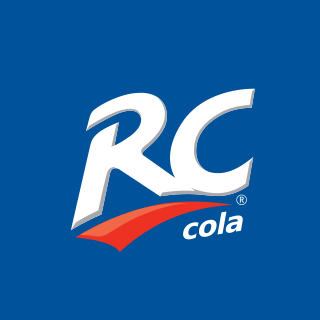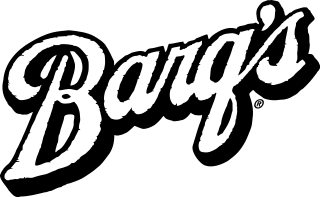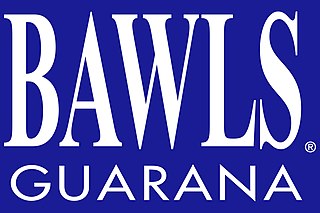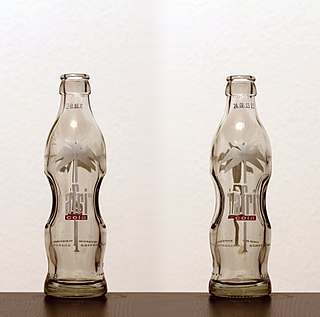Related Research Articles

Coca-Cola, or Coke, is a cola soft drink manufactured by the Coca-Cola Company. In 2013, Coke products were sold in over 200 countries worldwide, with consumers drinking more than 1.8 billion company beverage servings each day. Coca-Cola ranked No. 94 in the 2024 Fortune 500 list of the largest United States corporations by total revenue. Based on Interbrand's "best global brand" study of 2023, Coca-Cola was the world's sixth most valuable brand.

Cola is a carbonated soft drink flavored with vanilla, cinnamon, citrus oils, and other flavorings. Cola became popular worldwide after the American pharmacist John Stith Pemberton invented Coca-Cola, a trademarked brand, in 1886, which was imitated by other manufacturers. Most colas originally contained caffeine from the kola nut, leading to the drink's name, though other sources of caffeine are generally used in modern formulations. The Pemberton cola drink also contained a coca plant extract. His non-alcoholic recipe was inspired by the coca wine of pharmacist Angelo Mariani, created in 1863.

Pepsi is a carbonated soft drink with a cola flavor, manufactured by PepsiCo. As of 2023, Pepsi is the second most valuable soft drink brand worldwide behind Coca-Cola; the two share a long-standing rivalry in what has been called the "cola wars".

RC Cola is a cola-flavored carbonated beverage owned in the United States by Keurig Dr Pepper and internationally by RC Global Beverages, Inc.

Jolt Cola was a carbonated soft drink produced by The Jolt Company, Inc.. The cola drink was created in 1985 by C. J. Rapp as a highly caffeinated beverage. It was targeted towards students and young professionals, stressing its use as a stimulant in a similar manner as energy drinks. Its slogan reads "All the sugar and twice the caffeine!"

Barq's is an American brand of root beer created by Edward Barq and bottled since the beginning of the 20th century. It is owned by the Coca-Cola Company. It was known as "Barq's Famous Olde Tyme Root Beer" until 2012. Some of its formulations contain caffeine.

Tab was a diet cola soft drink produced and distributed by The Coca-Cola Company, introduced in 1963 and discontinued in 2020. The company's first diet drink, Tab was popular among some people throughout the 1960s and 1970s as an alternative to Coca-Cola. Several variations were made, including a number of fruit-flavored, root beer, and ginger ale versions. Caffeine-free and clear variations were released in the late 1980s and early 1990s.

Surge is a citrus-flavored soft drink first produced in the 1990s by the Coca-Cola Company to compete with Pepsi's Mountain Dew. Surge was advertised as having a more "hardcore" edge, much like Mountain Dew's advertising at the time, in an attempt to lure customers away from Pepsi. It was originally launched in Norway as Urge in 1996, and was so popular that it was released in the United States as Surge in 1997. Lagging sales caused production to be ended in 2003 for most markets.

Bawls is a non-alcoholic, highly-caffeinated soft drink.

The Coca-Cola Company is an American multinational corporation founded in 1892. It manufactures, sells and markets soft drinks including Coca-Cola, other non-alcoholic beverage concentrates and syrups, and alcoholic beverages. Its stock is listed on the New York Stock Exchange and is a component of the DJIA and the S&P 500 and S&P 100 indexes.

Afri Cola is a cola soft drink produced in Germany. The trademark Afri-Cola was registered in 1931 by the company F. Blumhoffer Nachfolger GmbH. The same company also produced Bluna, an orange soft drink. Today the brand belongs to the Mineralbrunnen Überkingen-Teinach AG. Afri Cola was once one of the most popular cola brands in Germany, but has lost considerable market share since the 1960s.
Enviga is a Nestea carbonated canned green-tea drink. Enviga is a trademark of Nestlé licensed to Beverage Partners Worldwide, a joint venture between The Coca-Cola Company and Nestlé. It is available in three flavors: Green Tea, Tropical Pomegranate, and Mixed Berry. According to Coca-Cola, Enviga burns 60 to 100 calories per three 12-oz.(330 ml) cans due to its high EGCG and caffeine content. The makers of the drink were sued for making fraudulent health claims about weight loss, and agreed to settle and cease repeating them.
Energy Brands, also doing business as Glacéau, is a privately owned subsidiary of The Coca-Cola Company based in Whitestone, Queens, New York, that manufactures and distributes various lines of drinks marketed as enhanced water. Founded in May 1996 by J. Darius Bikoff with an electrolyte enhanced line of water called Smartwater, Energy Brands initially distributed its products to health food stores and independent retailers in the New York area. Adding Fruitwater and Vitaminwater to its line in 1998 and 2000, respectively, the company expanded to nationwide distribution in the early 2000s.
Tab Clear was a variation of Tab. It is Coca-Cola's contribution to the short-lived "clear cola" movement during the early 1990s. It was introduced in the United States on December 14, 1992, in the United Kingdom a month later and in Japan in March 1993 to initially positive results. Tab Clear was, however, discontinued after only a short time of marketing in 1994. Unlike most other "clear" soft drinks, Tab Clear contained caffeine and, according to the company, had the flavor of cola.
Wet Planet Beverages, of Pittsford, New York, was the company which produces Jolt Cola, Napa Valley Soda, Thornwood Estates, Autumn Frost, and DNA. They are also a distributor for Martinelli's Sparkling Cider.

Blue Sky Beverage Company was a beverage company that produced soft drinks and energy drinks. It is a wholly owned subsidiary of the Monster Beverage Corporation. The company was established in Santa Fe, New Mexico, in 1980, where it remained until it was purchased by Monster in 2000. Coca-Cola North America took ownership of Blue Sky Sodas, Hansen’s Juice Products, Hansen’s Natural Sodas, Hubert’s Lemonade, Peace Tea and other non-energy drink brands as part of Coke’s partnership with Monster Beverage Corp on Jun 12, 2015. Blue Sky Beverage Company now operates out of Corona, California. The southwestern look and feel of the artwork on the soda cans is reminiscent of the company's roots in New Mexico.

Sunkist is a brand of primarily orange-flavored soft drinks that launched in 1979. Sunkist primarily competes with The Coca-Cola Company's Fanta brand and Keurig Dr Pepper's Orange Crush brand.
A functional beverage is a conventional liquid food marketed to highlight specific product ingredients or supposed health effects.
Zevia is a Los Angeles based company that produces soft drinks, organic tea, energy drinks, and mixers sweetened with stevia. All Zevia products are zero-calorie, sugar-free, gluten free, vegan, certified kosher, and certified by The Non-GMO Project. In June 2021, Zevia filed to go public with an IPO.
References
- ↑ Alan Elliott (1998). A Daily Dose of the American Dream: Stories of Success, Triumph, and Inspiration. Thomas Nelson Inc. p. 9. ISBN 9781418571474 . Retrieved 22 January 2016.
- ↑
- "Jolt Cola maker files for bankruptcy protection". International Business Times. January 29, 2009. Archived from the original on January 29, 2016. Retrieved January 11, 2016.